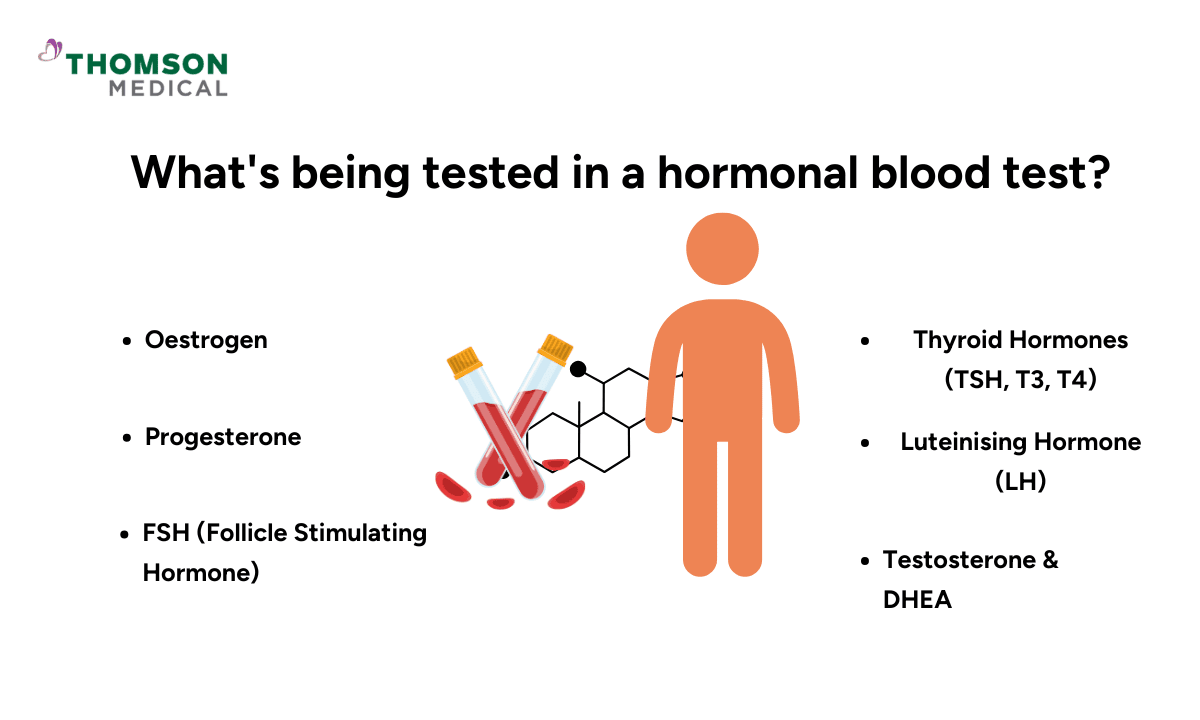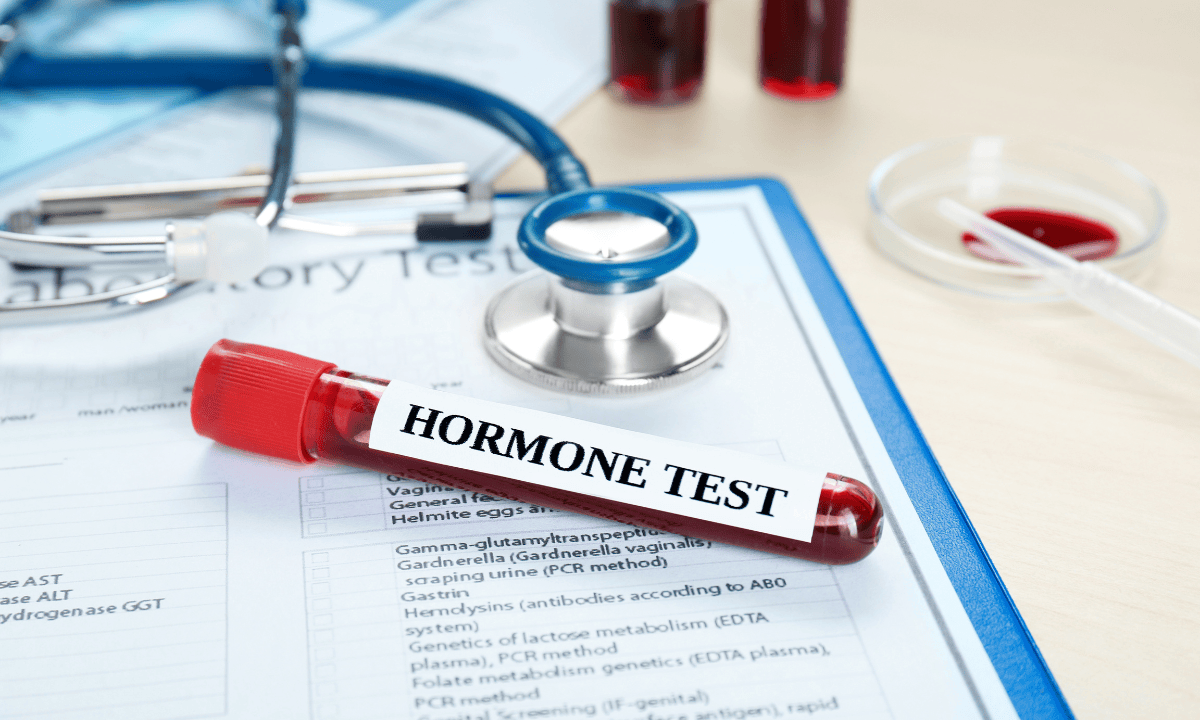Are you feeling "off" and don't know why? Maybe it's not just stress or 'getting older.
You eat well. You try to sleep more. You push through your day, but something still feels wrong.
Maybe you're constantly exhausted no matter how much rest you get. Maybe your weight keeps creeping up even though your diet hasn't changed. Or maybe mood swings, irregular cycles, or low energy are leaving you frustrated and unsure of what's happening inside your body.
These symptoms can significantly impact your daily life, relationships, and work performance. When lifestyle changes don't provide relief, it's often not about willpower; it could be your hormones sending signals that something needs attention. That's why hormone blood testing can provide the concrete answers you've been looking for.
What is hormone testing?
The human body is made up of several complex systems that work together to keep us healthy. Hormones are some of the body’s most important chemical messengers, helping to regulate metabolism, mood, growth, reproduction, and even the immune system.When hormone levels become too high or too low, or when the balance between different hormones is disrupted, a range of symptoms can appear.
Hormone levels can be measured using blood, urine, or saliva samples. The choice of test depends on which hormone is being assessed and the reason for testing. Hormone testing may be recommended to help diagnose underlying hormone disorders or to investigate symptoms such as fatigue, weight gain, depression, or menstrual changes.
Hormone tests can also be used as part of a broader evaluation for more complex conditions. However, they may not directly diagnose disorders like chronic fatigue syndrome, fibromyalgia, or autoimmune diseases.
Who needs hormone testing?
Hormone testing can be helpful for anyone showing signs that their hormone levels may be out of balance. Your doctor may recommend testing if you are experiencing:
Reproductive health concerns:
Irregular, absent, or particularly heavy menstrual cycles
Infertility challenges or difficulty conceiving
Menopausal symptoms such as hot flashes, night sweats, or mood changes
Physical symptoms:
Unexplained persistent fatigue that doesn't improve with rest
Unexplained weight gain or difficulty maintaining a healthy weight
Excessive hair growth (hirsutism), hair loss, or persistent acne
Changes in libido or sexual function
Emotional and cognitive changes:
Significant mood swings, anxiety, or depression
Brain fog or difficulty concentrating
Sleep disturbances that affect daily functioning
Growth and development issues:
Delayed puberty or abnormal growth patterns
Suspected thyroid-related symptoms
Hormone tests are also a common part of:
Routine workups for women undergoing fertility treatment
Men with testosterone concerns
Anyone with signs of endocrine disorders

What's being tested?

Oestrogen
Oestrogen is mainly produced in the ovaries and plays a key role in:
Regulating your menstrual cycle
Supporting fertility
Maintaining healthy bones
Developing female characteristics during puberty
Your doctor may check your oestrogen levels to assess menstrual irregularities, evaluate your menopausal status, monitor fertility treatments, and investigate abnormal uterine bleeding or oestrogen-related disorders.
Progesterone
Progesterone is essential for ovulation and pregnancy. It’s produced by the corpus luteum after you ovulate and helps prepare your body for a possible pregnancy.
Your doctor uses this test to:
Confirm if and when you’re ovulating
Check the luteal phase (second half of your cycle)
Evaluate fertility issues or risk of miscarriage
Monitor pregnancy or hormone therapy
Follicle stimulating hormone (FSH)
FSH is made by the pituitary gland in the brain. It stimulates the growth of eggs in the ovaries and helps control the menstrual cycle. In men, FSH supports sperm production.
Doctors use FSH tests to:
Check fertility and ovarian reserve
Diagnose menopause or early menopause
Evaluate pituitary gland function
Testosterone and Dehydroepiandrosterone (DHEA)
Testosterone is key for libido, muscle mass, and mood in both men and women. DHEA is an adrenal hormone and a precursor to sex hormones. Doctors use these tests to investigate low libido or erectile dysfunction in men, assess excess hair growth, acne, or polycystic ovary syndrome (PCOS) in women, and evaluate adrenal function and androgen excess.
Thyroid hormones
Thyroid hormones include TSH, T3, and T4. It helps to regulate metabolism, energy, and mood. TSH controls the release of thyroid hormones.
TSH testing helps:
Diagnose underactive (hypothyroidism) or overactive thyroid (hyperthyroidism)
Investigate symptoms like fatigue, weight changes, or mood problems
Assess if thyroid issues are affecting periods or fertility
Luteinising hormone
Luteinising hormone (LH) triggers ovulation in women and stimulates testosterone production in men. Doctors use this testing to assess your fertility, diagnose conditions like PCOS, or evaluate pituitary gland function.
Other hormones
Depending on symptoms, doctors may test:
Prolactin:
Its level may be elevated with pituitary tumours. Excess prolactin can cause irregular periods or milky nipple discharge.
Cortisol:
To evaluate adrenal function and your body's stress response.
Insulin:
To assess glucose metabolism and insulin resistance.
AMH (Anti-Müllerian Hormone):
Indicates ovarian reserve.

Get Check with Our Gynaecologist
Loading...
Preparing for your hormone test
How you prepare depends on which hormones your doctor needs to check. You must get plenty of rest before your test, as both stress and inadequate sleep can significantly affect your hormone levels, especially cortisol.
For some specific hormone tests, like insulin or cortisol, you may need to avoid eating or drinking anything except water for several hours beforehand.
If you're a woman with regular periods, timing is particularly important for certain hormone tests. For example, your doctor might ask you to schedule your FSH and LH tests on the second day of your menstrual cycle, while serum progesterone testing is typically done around day 21.
Your healthcare provider will give you specific instructions based on your individual situation to help ensure your test results are as accurate as possible.

What do the hormone test results mean?
| Hormone | High Levels | Low Levels |
|---|---|---|
| Estrogen (estradiol) | You might have ovarian tumours, oestrogen-producing cysts, early puberty, or be on hormone therapy. | Normal during menopause. Otherwise, it might indicate perimenopause, premature ovarian insufficiency, eating disorders, or extreme exercise. |
| Progesterone | Normal during pregnancy. May also indicate certain ovarian cysts. | May suggest you're not ovulating, have a luteal phase defect, or are at risk of miscarriage if pregnant. |
| FSH (follicle-stimulating hormone) | Suggests menopause, premature ovarian failure, or low ovarian reserve. | May indicate pituitary dysfunction or hypothalamic amenorrhoea (periods stopping due to stress or exercise). |
| LH (luteinising hormone) | May point to PCOS or menopause | Could be due to pituitary or hypothalamic issues |
| Testosterone (total/ free) | In women: May indicate PCOS, adrenal disorders, or androgen-secreting tumours | In men: Often linked to fatigue, low libido, erectile dysfunction, and muscle loss |
| DHEA-S | May be due to overactive adrenal glands (adrenal hyperplasia) or tumours | Adrenal insufficiency, aging |
| TSH (thyroid stimulating hormone) | Indicates an underactive thyroid (hypothyroidism) | Suggests an overactive thyroid (hyperthyroidism) |
| Free T3 and T4 | Sign of hyperthyroidism | Seen in hypothyroidism |
| Prolactin | May interfere with ovulation and periods; can be caused by stress, pituitary tumours, or medications | Rare, but may occur in pituitary dysfunction |
| Cortisol | Could suggest Cushing’s syndrome, stress, or certain tumours. | May indicate Addison's disease or adrenal insufficiency (not enough cortisol production) |
Note:
A total testosterone test checks the overall amount of testosterone in your blood, including both the hormone that’s freely circulating and the part that’s attached to proteins.
A free testosterone test looks only at the testosterone that isn’t bound to proteins—the part your body can actually use.
Are there any risks to the test?
The most common form of hormone testing is through blood draw, which has minimal risk.
You might notice a little discomfort when the needle enters, and some people develop mild bruising and tenderness where the needle was used to draw blood. Fasting before the test may cause lightheadedness or dizziness during or after blood withdrawal.
Hormone blood testing at Thomson Medical
With over 45 years of experience in women’s health, Thomson Medical offers a full range of hormone blood tests to check your reproductive, thyroid, adrenal, and metabolic health.
Our specialist doctors will determine which tests may be most suitable for your situation, guide you through the preparation process, and sit down with you to explain what your results mean in straightforward terms. Our service includes personalised care, offering hormone assessment and clinically appropriate professional guidance on next steps.
FAQ
How to check hormones in Singapore?
Hormone testing in Singapore is widely available and can be arranged through various healthcare providers, such as general practitioners (GPs), polyclinics (for subsidised services), private clinics, hospitals, and specialised centres, like endocrinologists, gynaecologists, and fertility clinics.
While some hormones may require urine or saliva samples, most hormone tests use blood samples.
Private clinics often offer faster appointments and quick results, sometimes within a week. Costs vary depending on the type and number of hormones tested and whether you choose a public or private facility.
Can I ask my GP for a hormone test?
Yes, you can ask your GP for a hormone test. GPs are often the first point of contact for symptoms such as irregular periods, fertility concerns, mood changes, unexplained fatigue, weight changes, or menopausal symptoms.
Your GP can order the appropriate hormone tests, interpret the initial results, and refer you to a specialist – such as an endocrinologist, gynaecologist, or urologist – if further evaluation is needed.
What are the signs of hormonal imbalance in women?
Hormonal imbalance symptoms can vary depending on which hormones are affected.
In women, common signs include:
Missed or irregular periods
Excess hair growth
Weight gain or difficulty losing weight
Mood swings, anxiety, or depression
Fatigue or low energy
Acne or oily skin
Trouble conceiving
Hot flashes or night sweats
At what age should I get my hormones checked?
There is no set age for hormone testing. It depends on your symptoms, health status, and life stage. Women in their 20s to 40s may need testing for menstrual or fertility issues, while those over 45 may be checked for perimenopause or menopause. Men over 40 might consider testing for testosterone decline, particularly if they are experiencing fatigue, low libido, or muscle loss.
Teens and young adults who experience delayed or unusual puberty may require hormone tests. Anyone experiencing symptoms of hormonal imbalance at any age should consider testing.
Do gynaecologists do hormone testing?
Yes, gynaecologists regularly order and interpret hormone tests, especially for women with irregular cycles, fertility problems, menopausal symptoms, suspected PCOS, or other hormone-related conditions. They are trained to assess reproductive hormones, such as oestrogen, progesterone, LH, and FSH, as part of a comprehensive women’s health evaluation.
Are a hormone panel test and a hormone blood test the same thing?
No, a hormone panel test and a hormone blood test are not the same, although they share a common link. A hormone blood test measures the levels of specific hormones in your blood sample, while a hormone panel test is a comprehensive blood test that measures multiple hormones at once.
When your doctor orders a single hormone blood test, they're focused on checking the levels of one specific hormone, such as oestrogen or testosterone. This targeted approach might be used when your symptoms point to an issue with a particular hormone.
In contrast, a "hormone panel test" examines several related hormones simultaneously from your single blood sample. For example, a female hormone panel might check oestrogen, progesterone, FSH, and LH levels together, giving your doctor a more complete picture of your hormonal balance.
Both tests use blood samples, but the panel provides a broader view of how different hormones in your body are working together.

The information provided is intended for general guidance only and should not be considered medical advice. For personalised recommendations and tailored advice, please consult a specialist at Thomson Medical. Request an appointment with Thomson Medical today.
For more information, contact us:
Thomson Specialists Paragon (Health Screening)
- Mon - Fri: 8.30am - 5.30pm
- Sat: 8.30am - 12.30pm
Call: 6735 0300
See Health Screening Packages
Notice:
The range of services and tests may vary. Please contact us directly to enquire about the current availability.
Book Health Screening